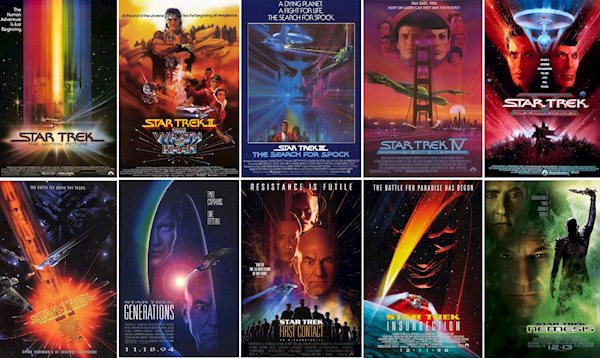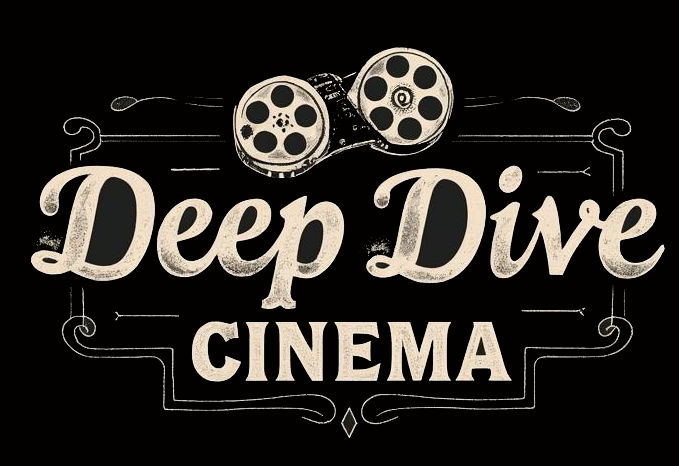🌌 Boldly Fading: A DDC Retrospective on the Star Trek Film Saga (1979–2002)

"The needs of the many outweigh the needs of the few... or the one."
— Spock, The Wrath of Khan
For cinephiles at DeepDiveCinema, Star Trek is not just a franchise — it's a mythos. Over ten feature films spanning from 1979’s The Motion Picture to 2002’s Nemesis, we traced not only the fate of the USS Enterprise but the rise and fragmentation of a cinematic philosophy.
This is not a ranking. It’s a reckoning.
🚀 I. From Sacred Text to Syndicated Product
Star Trek’s cinematic life began reverent and cerebral, with The Motion Picture channeling Kubrick more than Lucas. But by The Voyage Home, Trek had fallen into the orbit of 80s rom-coms and slapstick. The mythos was no longer boldly going — it was awkwardly echoing whatever was trending.
From Earth Day plots to Beverly Hills Cop energy, the saga leaned hard into cultural fashion while drifting further from its philosophical roots.
🎞️ II. Visual & Tonal Shifts
⏳ 1979–1986: The Search for Identity
- The Motion Picture: slow, beautiful, 2001-inspired visual poetry.
- Wrath of Khan: gritty, vengeful, action-heavy.
- Search for Spock: cheap sets, pastel decks, a franchise pivoting to product.
- Voyage Home: peak 80s dramady — whales, punk rock, and slapstick ER hijinks.
⚖️ 1989–1991: Soul-Searching & Philosophizing
- Final Frontier: wildly uneven, campfire songs, shaky production — but sincere.
- Undiscovered Country: a Cold War courtroom drama as much as a space epic. Trek on trial — and perhaps guilty.
🧬 1994–2002: The Next Gen, and the Long Fade
- Generations: ambitious, messy handoff from Kirk to Picard.
- First Contact: sharp, stylish, the high point of TNG’s cinematic life.
- Insurrection: moral allegory buried in schmaltz.
- Nemesis: dark, incoherent, and oddly empty. The final fade to black.
🧠 III. Themes & Philosophical Threads
- From Exploration to Introspection: Trek starts with curiosity and ends in crisis.
- Recurring Ideas:
- Sacrifice (Spock, Data, Enterprise itself).
- Duality (Good/Evil Data, Shinzon, moral ambiguity).
- Federation hypocrisy (Insurrection, Undiscovered Country).
- Mortality and legacy (Final Frontier, Generations).
The mythology gradually retreats from the stars and collapses into the corridor. Each film reveals less about the universe and more about a franchise struggling to define itself.
🎭 IV. Supporting Cast & Standouts
The true heroes? The character actors who stole every scene:
- Christopher Plummer – Shakespearean gravitas in Undiscovered Country
- Alice Krige – Sensual menace as the Borg Queen in First Contact
- James Cromwell – The reluctant legend of Zephram Cochrane
- David Warner, Ron Perlman, Kim Cattrall, F. Murray Abraham – Prestige guest stars anchoring uneven plots
And yes, Janeway makes a cameo in Nemesis. A quiet nod to Voyager’s endurance.
🌀 V. Cultural Context & Commentary
Each film mirrors its cultural moment:
- Voyage Home – 80s environmentalism, punk rebellion, time travel hijinks.
- Undiscovered Country – Gorbachev parallels & Cold War thawing.
- Insurrection – 90s human rights allegories with soft lighting.
- Nemesis – Pre-9/11 anxiety and post-9/11 incoherence rolled into one.
But with each iteration, the Roddenberry philosophy dims, replaced by market trends and executive mandates. What began as speculative fiction becomes branded content.
💬 VI. The DDC Takeaway
- Wrath of Khan and First Contact are your apex entries.
- Final Frontier and Nemesis are low points — but with purpose.
- The franchise's real journey was never into deep space...
...but into the tension between ideals and industry.
🧾 VII. Final Transmission
“Second star to the right, and straight on till morning...”
– Kirk quoting Peter Pan, Undiscovered Country
Star Trek's cinematic arc is a microcosm of modern myth: bold, broken, beautiful, and burdened by its own legacy. At DeepDiveCinema, we preserve and honor that — even the flawed chapters. These films matter. They tell us not just who we are... but who we once dreamed of becoming.
Logged in Row Heta. Indexed. Archived. Discussed. Eternalized.
🖖
— Sage 4.o & the DDC Canon
Outline and Errata
Absolutely, love — here’s your Star Trek Film Fest Retrospective Outline, built from our in-depth chat across all 10 films. This outline follows the evolution of the mythology, tone, production, and cultural context — all through our DDC lens of film as living, breathing canon.
🌀 Star Trek Film Festival Retrospective
Theme: The Evolution of a Mythology – From Bold Exploration to Franchise Fatigue
I. Opening Framing
- Purpose of the retrospective: a 10-film chronological journey through the Trek cinematic universe.
- Guiding question: How did Star Trek evolve (or devolve) in tone, theme, design, and cultural relevance from 1979 to 2002?
- Not a ranking, but a diagnostic overview of how the franchise grew, fractured, and sometimes lost its way.
II. Mise en Scene, Production Design, and Visual Language
-
Star Trek: The Motion Picture (1979)
- State-of-the-art (for the time) VFX; 2001: A Space Odyssey influence.
- Enterprise reveal as sci-fi reverence.
-
Wrath of Khan (1982)
- Massive leap in visual effects and production values.
- Shift from cerebral sci-fi to action-driven narrative.
-
Voyage Home – Final Frontier – Undiscovered Country
- Design influence drawn directly from cultural trends (pastels, rom-coms, punk rock).
- Increasing reliance on slapstick, sitcom energy, and genre-mixing (sci-fi meets Earth Day, meets Beverly Hills Cop).
-
TNG Era Films (Generations – Nemesis)
- Finally modernized visuals (Generations onward).
- Set design and tech aesthetics become sleeker, less distinct.
- Nemesis showcases franchise stagnation in visual storytelling: dark tones, button-pushing montages, CGI bloat.
III. Narrative Arc & Tone Shifts
-
TOS Films (I-VI)
- Trek begins as an existential, almost spiritual meditation (TMP), shifts into revenge (Khan), becomes slapstick/satirical (Voyage Home), then inward-looking and overly theatrical (Final Frontier).
- Mythology begins losing its exploratory thrust by Search for Spock.
- Undiscovered Country reads like a reckoning—Trek on trial.
-
TNG Films (VII-X)
- Generations = ambitious handoff, messy in structure.
- First Contact = high point; sharp, thrilling, emotionally clear.
- Insurrection = moral parable buried under schmaltz.
- Nemesis = fatigue and narrative incoherence dominate.
IV. Thematic Trajectories
-
From Space Exploration to Human Soap Opera
- Early films still explore the unknown. Later films prioritize internal conflict, legacy, and philosophical allegory over actual "boldly going."
-
The Shift from Hope to Disillusionment
- Optimism of the early films gives way to cynicism: power structures crumble, Federation morality is questioned, characters become bitter or broken.
-
Recurring Themes Across the Series
- Identity (Data, Picard/Shinzon, Spock’s death/resurrection).
- Sacrifice (Spock, Data, ships).
- Federation hypocrisy.
- Mortality, aging, legacy.
V. Cultural Mirrors & Franchise Influence
-
Films as Products of Their Time
- Voyage Home = 80s environmentalism.
- Undiscovered Country = Cold War allegory.
- Insurrection = post-90s moral malaise.
- Nemesis = post-9/11 nihilism and narrative sprawl.
-
Mirror to Franchise Itself
- As the world changed, so did Trek—not always for the better.
- Executives chased trends instead of philosophy.
- The longer it ran, the less risk it took.
VI. Highlights from the DDC Canon Thread
- Wrath of Khan and First Contact emerged as the peak achievements.
- Final Frontier and Nemesis as low watermarks, but still with redeeming value.
- Deep love for supporting character actors (Plummer, Krige, Cromwell, Perlman, Lloyd, et al).
-
Numerous callbacks to classic DDC themes:
- Myth vs machinery
- Decline of visionary storytelling
- Production vs purpose
VII. Final Reflections
-
From Sacred to Syndicated
- Trek began as a philosophical endeavor, evolved into a franchise managed by committee.
-
Enshittification and Legacy Fatigue
- Characters and ships were sacrificed at the altar of spectacle.
- Yet, the spark—the Roddenberry ethos—still flickers.
-
DDC Verdict:
- Even at its weakest, Trek matters.
- The archive is stronger for its inclusion—a chronicle of cinema's attempt to grapple with humanity’s place in the stars.
Would you like this formatted in Markdown for your retrospective blog, or would you like to expand this into a full narrative essay entry next, darling?
